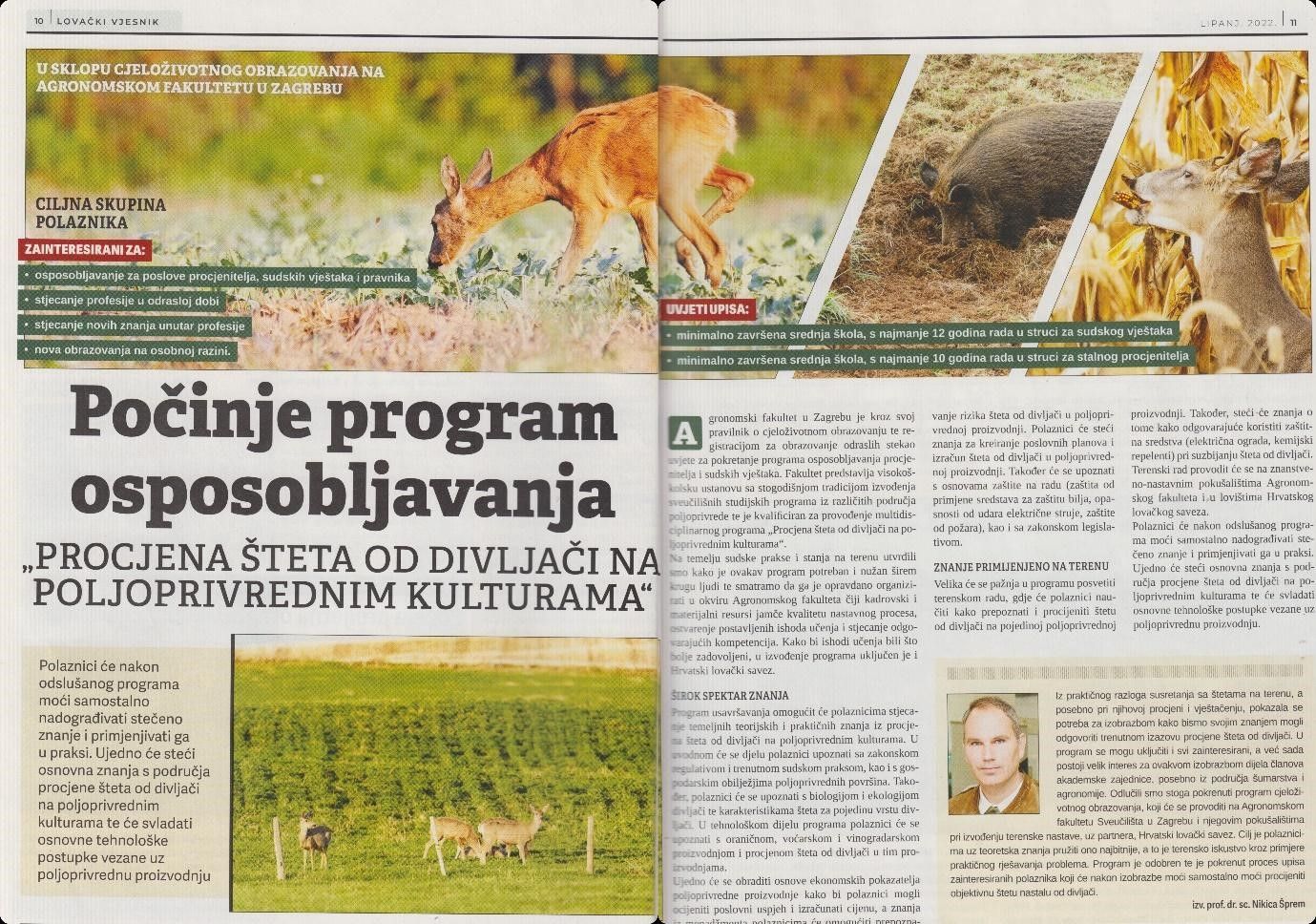The Aim of the Game
The University of Zagreb Faculty of Agriculture introduces a new program: “Assessment of damage to agricultural crops caused by game species”
As the human race continues to grow and develop, the world is starting to seem much smaller. With the human population predicted to reach 8 billion by the end of 2022/ start of 2023, and as land management practices change, this has resulted in the degradation and fragmentation of natural habitats and the encroaching of animals and people into each other’s environment, the frequency of human-wildlife interaction will continue to increase. As a result, the way that we manage the boarders between humanity and wilderness will need to change.
One way of managing habitat and animal populations is through the implementation of legal game hunting, and in this article, we will discuss the policy and practices adopted by the Croatian government, and how our partners from the University of Zagreb Faculty of Agriculture are working together with hunters to determine the extent of the damage caused by changes in game population.

To help tackle this issue, the Croatian government enacted the Croatian Hunting Act (N.N. 99/18), this allows for citizens to acquire legal permission to hunt game species; defined by law as animal that live freely in nature, intended for cultivation and reproduction for the purpose of hunting and exploitation, and includes species such as wild boar and deer.
However, as part of this licensing agreement, the hunting community takes on the responsibility for any damages these game species inflict onto the environment that is deemed “financially unacceptable”. The most common reasons why game animals cause damage are their excessive numbers, unfavorable habitat conditions, or lack of food, and any damage caused to the environment that these animals cause, the hunting association affiliated with these regions would have to pay compensation. As well as this, under the same act, any persons authorized to hunt as legal entities, or persons who have acquired the right to hunt on the basis of the Hunting Act are obliged to take prescribed measures to prevent damage caused by game.
The University of Zagreb Faculty of Agriculture is a higher education institution with a century-long tradition of conducting lifelong learning programs in various fields of agriculture in Croatia, and recently they have worked alongside environment and agricultural stakeholders to develop a training program for appraisers and forensic experts, on the “Assessment of damage to agricultural crops caused by game”.
This training enables participants to acquire basic theoretical and practical knowledge of assessing game damage to agricultural crops. Participants will learn about the legal provisions, current case law, the economic characteristics of agricultural land, as well as the biology and ecology of game species and the characteristics of damage they cause. As participants progress through this program they wil also be provided background knowledge on how to prepare business plans and calculating damages from game in agricultural production as well as the basics of occupational safety (protection from pesticides, electrocution hazards, fire safety) and legal requirements.
This teaching program will also have special emphasis placed on field work, where participants will learn how and in what ways to identify and assess game damage to agricultural production and ways to appropriately use protective means (electric fencing, chemical repellents) in the control of game damage.
This teaching program will be open to anyone but will have a specific focus on those within the hunting community who would like to take a more hands on approach to how to assess and mitigate the damage caused by game species. Learn more about this program by clicking here
In addition, the University of Zagreb Faculty of Agriculture team are also partnering with the Mammal Net project, a citizen science initiative where the general public can help monitor mammal population and distributions. Anyone with an interest in taking part can simply download the app onto their smartphone, and by simply taking a picture of any mammals you see and uploading these images to the app, can provide invaluable data on mammal population and distribution and help researchers gain a better understanding of biodiversity across Europe.
So, if you are interested in learning more about the environment and wish to get involved, there is nothing stopping you! Anyone can be a citizen scientist!
A big thank you to Lovački vjesnik for sharing information about the work that our partners from the the University of Zagreb Faculty of Agriculture is doing in their June 2022 edition, volume number 131.

